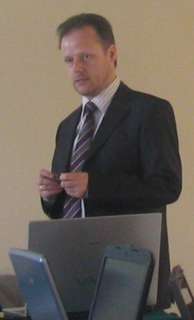Off topic: 10 Misconceptions about Translators and Translation Thread poster: Maria Luisa Duarte
|
|---|
Dear Colleagues.
Something to think about:
Clients that offer 0.02Euros per word are looking for translators that fit the following characteristics.
Regards.
MLD
1.Anyone with two years of high school language (or anyone who lived in another country for three years during early childhood) can translate.
2-There’s no difference between translation, transcription, and transliteration.
3.A good translator doesn�... See more Dear Colleagues.
Something to think about:
Clients that offer 0.02Euros per word are looking for translators that fit the following characteristics.
Regards.
MLD
1.Anyone with two years of high school language (or anyone who lived in another country for three years during early childhood) can translate.
2-There’s no difference between translation, transcription, and transliteration.
3.A good translator doesn’t need any reference literature.
4.Translators will soon be replaced by computers.
5.Translators don’t need to know how to spell, since they can use the spell checker on their computer.
6.A good translator gets it right the first time, without any editing or proofreading.
7.If you can type in a foreign language then you are an accomplished translator.
8.Translators can translate both ways just as easily.
9.A 100-page technical manual that took four months and three persons to write can be translated into another language by one translator in two days.
10.Good translators are a dime a dozen.
An excerpt from "The Translator's Handbook"
Schreiber Publishing, Inc. ▲ Collapse
| | | | Jerzy Czopik 
Germany
Local time: 13:44
Member (2003)
Polish to German
+ ...
| Very interesting points of view | Sep 22, 2003 |
Thank you very much for posting this.
Kind regards
Jerzy
| | | | Henry Hinds 
United States
Local time: 05:44
English to Spanish
+ ...
In memoriam | Qualifications | Sep 23, 2003 |
Thank God they list these as "10 Misconceptions about Translators and Translation". I was thinking for a moment that they were listing the qualifications, and since I don't meet all of them, I might as well hang it up along with quite a few other colleagues!
| | | |
[quote]Maria
4.Translators will soon be replaced by computers.
Computer translation is getting better. An Aug 2003 Heral Tribune article quotes a leading researcher at John Hopkins U that MT will deliver excellent output in French, German, Spanish and English pairs in about 5 years. There will be fewer translators and they will be mostly editing (though not novels). It is better to anticipate this now rather than wait 5 years.
| | |
|
|
|
PAS 
Local time: 13:44
Polish to English
+ ...
| No, no - some of this is quite wrong | Sep 23, 2003 |
Maria Luisa Duarte wrote:
1.Anyone with two years of high school language (or anyone who lived in another country for three years during early childhood) can translate.
This is blown much out of proportion. This point should read: "...anyone who completed a three-month intensive language course..."
But seriously...
One thing a computer will never do (OK - not in my life) is make changes in the target text according to the client's needs. This goes much beyond mere "editing".
A simple example is to change currency values in the text, but it also includes rewriting parts of it to make it more readable. I am doing it at this moment. Not only does my source text ramble on a bit, but I am also making changes to accommodate for the "realities" of the country in which the text will be used (this is all authorized and consulted, of course).
Now, maybe I'm a retro grouch, but I just cannot imagine how a computer will be able to make such decisions in 5 years. And even if it will, how much would it all cost?
Cheers,
Pawel Skalinski
[Edited at 2003-09-23 06:32]
| | | |
I would not expect a computer to make stylist rewrites either. Yet that could have been done with an editor originally. The point is that there is a large amount of work that would not require this , especially if the cost is low. But costs would drop dramatically in different ways including a firm that has variations on a trnaslation. It may be more than 5 years out, but we are moving quickly toward a time where MT will cut volume/time, meaning that tranlators compete for less work and have a ... See more I would not expect a computer to make stylist rewrites either. Yet that could have been done with an editor originally. The point is that there is a large amount of work that would not require this , especially if the cost is low. But costs would drop dramatically in different ways including a firm that has variations on a trnaslation. It may be more than 5 years out, but we are moving quickly toward a time where MT will cut volume/time, meaning that tranlators compete for less work and have a greater editing role. ▲ Collapse
| | | | | Learning from experience | Sep 30, 2003 |
Hi,
I formerly worked in the offshore industry as a surveyor. It got boring when computers started doing all the work. These days, the computers even steer the ships along the survey course!
Does this mean that all the surveyors are out of a job?
No, it doesn't.
Surveyors are the quality control instrument and have a much easier time of it -- but they're no less essential.
So, transferring to the translation industry, I can well imagine computers o... See more Hi,
I formerly worked in the offshore industry as a surveyor. It got boring when computers started doing all the work. These days, the computers even steer the ships along the survey course!
Does this mean that all the surveyors are out of a job?
No, it doesn't.
Surveyors are the quality control instrument and have a much easier time of it -- but they're no less essential.
So, transferring to the translation industry, I can well imagine computers offering (ever improving) quality translations. But only a fool would pass this on without a quality-control check.
This is where the translator comes in. He/She's the only one that can truly judge if source and target are in agreement. The question is whether the reduction in work for the translator is cheaper than just getting a qualified human to do it in the first place.
Some disciplines will continue to require human input (advertising copy, literature...) but others will probably be satisfied with pure machine transltion. Unfortunately.
-Nils- ▲ Collapse
| | | | | Machine translation | Oct 1, 2003 |
Whatever has been written about MT might perhaps be true of translations between structurally similar languages (like English into French or Spanish), whereas any attempts at translating from English into Polish that I have come across are simply ghastly. It would take a lot of time, effort and money to make them at least readable in Polish. It would be much better for those texts to be translated by a human originally! I don't think humans will ever be replaced by computers in this area (unless... See more Whatever has been written about MT might perhaps be true of translations between structurally similar languages (like English into French or Spanish), whereas any attempts at translating from English into Polish that I have come across are simply ghastly. It would take a lot of time, effort and money to make them at least readable in Polish. It would be much better for those texts to be translated by a human originally! I don't think humans will ever be replaced by computers in this area (unless computers are equipped with human intelligence and perception - but in that case what are they - in s.f. they are called androids).
As to what PAS wrote about rewriting texts - there is a name to it that has become a catchword lately - namely localisation. This is a totally new service, offered by more and more companies nowaday. If anyone is interested in knowing more you may consult www.lisa.org site (LISA - Localisation Industry Standards Association).
As regards a perception of translators which started this topic - I always thought it was typical of Poland, where anyone who spent a couple of months in London washing dishes in a pub was (by some) considered to be a fully-fledged English translator. I now have learned that, alas, this is a global trend. Sad!!!
[Edited at 2003-10-01 06:01] ▲ Collapse
| | |
|
|
|
aivars 
Argentina
Local time: 08:44
English to Spanish
+ ...
| 5 years to go | Oct 6, 2003 |
[quote]Todd Kreider wrote:
Maria
4.Translators will soon be replaced by computers.
Computer translation is getting better. An Aug 2003 Heral Tribune article quotes a leading researcher at John Hopkins U that MT will deliver excellent output in French, German, Spanish and English pairs in about 5 years. There will be fewer translators and they will be mostly editing (though not novels). It is better to anticipate this now rather than wait 5 years.
So then we'll be jobless in 5 years. What's your anticipation advice?
| | | | two2tango 
Argentina
Local time: 08:44
Member
English to Spanish
+ ...
| Not afraid of computers | Oct 6, 2003 |
I have first-hand experience with computers and software, and I like them a lot, but I am not at all worried about machines taking over our jobs.
Computers are very good and fast at performing without distraction and with little or no error simple jobs or decisions with very clear rules.
When a computer performs a very complicated task, it is because the programmers have previously cut it into pieces or "elemental jobs" small enough for the very limited "intelligence"... See more I have first-hand experience with computers and software, and I like them a lot, but I am not at all worried about machines taking over our jobs.
Computers are very good and fast at performing without distraction and with little or no error simple jobs or decisions with very clear rules.
When a computer performs a very complicated task, it is because the programmers have previously cut it into pieces or "elemental jobs" small enough for the very limited "intelligence" of the computer and its software.
We could say that a task, no matter how big or complicated, could be done by a computer if it can be reduced to a finite number of simple decisions and operations. For instance Deep Blue's chess victory on Gary Kasparov was a show of brute force, not of a defeat of human race at the hands of a new silicon god.
Now when we talk about translation, this "elemental task" would be the translation of a segment. And in average translating a segment is not simpler that translating the whole text, and therefore not into computer's field of advantage.
And of course there is the argument that computer science moves so fast that what looks a dream today becomes trivial five years later. But computers are only tools, and in this case the limitation resides in the linguistic side. We should start worrying the day translation can be reduced to a linguistic algorithm (including register, context and idioms).
Instead of competition, I foresee a better integration of human translators and their computers.
Enrique Cavalitto
[Edited at 2003-10-06 12:41] ▲ Collapse
| | | | sylver 
Local time: 19:44
English to French
| Computerized translation | Oct 29, 2003 |
two2tango wrote:
I have first-hand experience with computers and software, and I like them a lot, but I am not at all worried about machines taking over our jobs.
Computers are very good and fast at performing without distraction and with little or no error simple jobs or decisions with very clear rules.
When a computer performs a very complicated task, it is because the programmers have previously cut it into pieces or "elemental jobs" small enough for the very limited "intelligence" of the computer and its software.
We could say that a task, no matter how big or complicated, could be done by a computer if it can be reduced to a finite number of simple decisions and operations. For instance Deep Blue's chess victory on Gary Kasparov was a show of brute force, not of a defeat of human race at the hands of a new silicon god.
Now when we talk about translation, this "elemental task" would be the translation of a segment. And in average translating a segment is not simpler that translating the whole text, and therefore not into computer's field of advantage.
And of course there is the argument that computer science moves so fast that what looks a dream today becomes trivial five years later. But computers are only tools, and in this case the limitation resides in the linguistic side. We should start worrying the day translation can be reduced to a linguistic algorithm (including register, context and idioms).
Instead of competition, I foresee a better integration of human translators and their computers.
Enrique Cavalitto
[Edited at 2003-10-06 12:41]
I agree with you. About those 5 years they spoke about, I would have a strong tendency to consider it as misinformation. Talk to the general public, or even to some of the non-general public, and you will be amazed to see a number of them think that it has already been done, and that it is working.
Machine translation is one of the oldest dreams in terms of computer history, along with AI, and here we are, 50-60 years later, millions have been spent and we are still pretty close to square one. Computers are still fully and utterly unable of independant thought and understanding. Yeah, it may very well work in Starwars but unfortunatelly, in the real world, it doesn't.
Computer can help us do our job, make it faster, easier,... but I am prettty sure that we have more then just 5 years ahead of us.
| | | | To report site rules violations or get help, contact a site moderator: You can also contact site staff by submitting a support request » 10 Misconceptions about Translators and Translation | TM-Town | Manage your TMs and Terms ... and boost your translation business
Are you ready for something fresh in the industry? TM-Town is a unique new site for you -- the freelance translator -- to store, manage and share translation memories (TMs) and glossaries...and potentially meet new clients on the basis of your prior work.
More info » |
| | CafeTran Espresso | You've never met a CAT tool this clever!
Translate faster & easier, using a sophisticated CAT tool built by a translator / developer.
Accept jobs from clients who use Trados, MemoQ, Wordfast & major CAT tools.
Download and start using CafeTran Espresso -- for free
Buy now! » |
|
| | | | X Sign in to your ProZ.com account... | | | | | |












